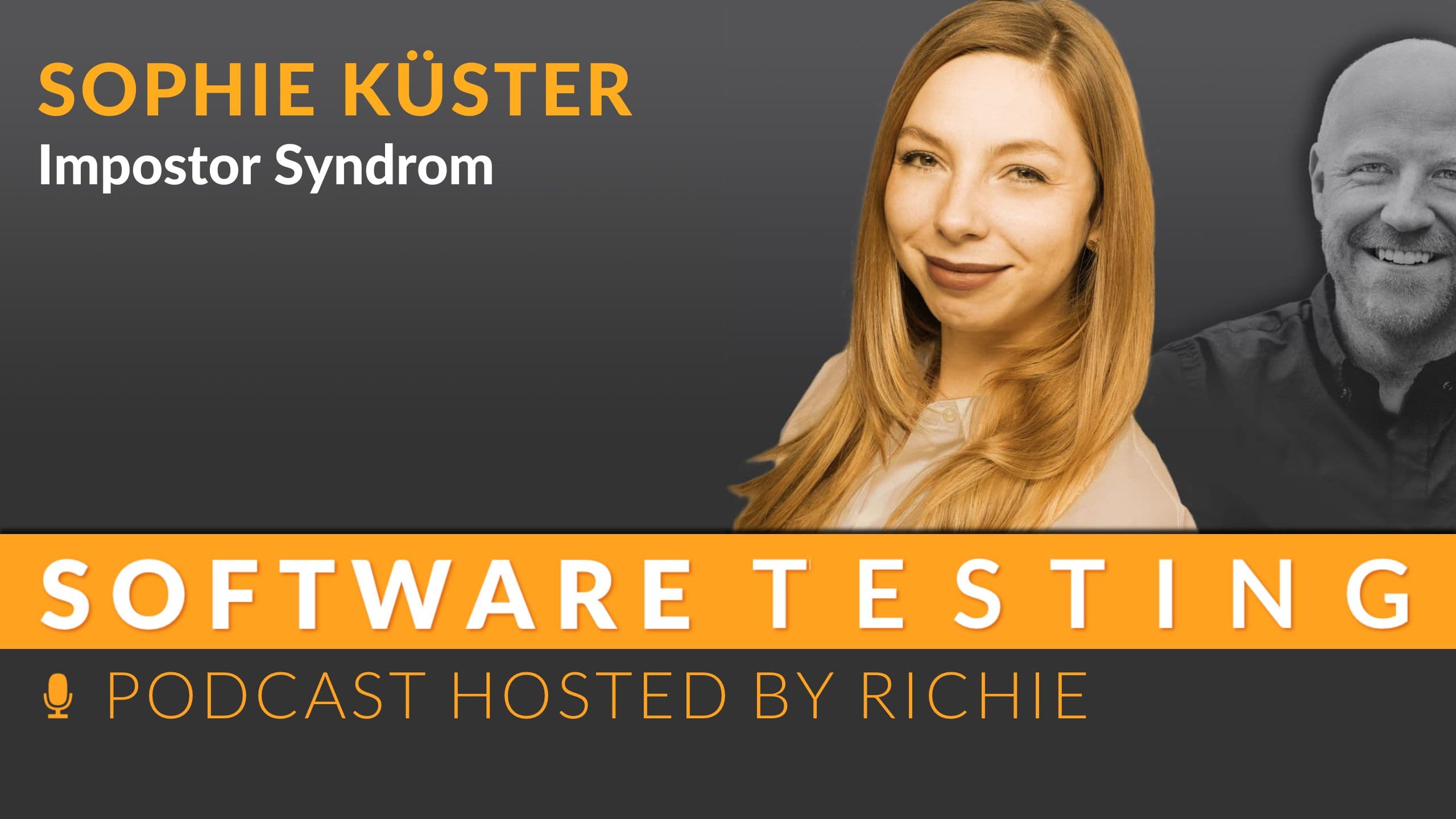House of Agile Quality
Thomas and Nico developed the House of Agile Quality (HOAQ) concept as part of a joint training course. Typically for big ideas, it came about rather...

Do you sometimes feel like you’re just playing a role and that your success will soon be revealed as a fluke? Impostor syndrome quietly creeps into our thoughts and whispers self-doubt, even when all the signs point to success. It makes us believe we are not good enough, even though we have worked hard to get where we are. This inner critic can act like an invisible wall that prevents us from realizing our true potential. But what if this doubt is unfounded? What if the real deceiver is not ourselves, but the voice that keeps us down? Maybe it’s time to expose the Impostor Syndrome and finally accept that we are exactly where we are supposed to be.
In this episode of the podcast, I welcome Sophie Küster, who tells us all about Impostor Syndrome. Sophie, who has been a guest on the podcast before, always brings new and human perspectives to the topic of quality and testing. We talk about the fear of being exposed as an impostor, even though there is no evidence of it. Sophie shares her own experiences and gives tips on how to deal with these feelings. We discuss the importance of sharing with others and realizing that you are not alone. An inspiring conversation that shows how you can be courageous and successful despite doubts.
“On the contrary, there is a lot of evidence for exactly the opposite. So, for example, I still feel like an impostor about my math diploma. Because I think, yeah, I’m so bad at math. How did I do that, that people believed for long enough that I could do enough math to get a diploma for it?” - Sophie Küster
As a child, Sophie wanted to be a ballerina or an astronaut, or both. Today, after gaining degrees in mathematics and yodeling, she is a test automation engineer at cronn, a software company in Bonn. After years of successfully chasing bugs, she now occasionally puts on her developer hat and simply writes the bugs herself. Sometimes she speaks at conferences, and since fate has given her a leg or two, she is particularly keen to raise awareness and improve communication about mental health and self-care.When she’s not at her computer, she can be found on a stand-up paddleboard, in a tent (surprisingly often in the rain) or on a ballet barre. Unfortunately, never in a spaceship.
Have you ever thought that your success is just a coincidence and that you could be exposed as a fraud at any time? Welcome to the club of Impostor syndrome! A phenomenon that afflicts even the most brilliant minds and makes us doubt our own abilities.
Self-doubt can drive you to improve. But when they get out of hand, they become a burden. Why do we allow our inner critic to be louder than our own successes? Perhaps it’s time to put a stop to it.
We often chase after the ideal of perfection, but it always remains unattainable. And that’s a good thing! Imperfections make us unique. Mistakes are not weaknesses, but opportunities to grow. So why not let go of the pressure and just be yourself?
The way out of the Impostor Syndrome begins with the decision to no longer allow yourself to be ruled by self-doubt. Recognize your own value and let your true potential shine. The world doesn’t need perfect people, it needs authentic personalities.
The most common symptoms of Impostor Syndrome are self-doubt, the feeling of not being competent enough and fear of discovery. Those affected tend to trivialize their own successes and believe that they are just lucky or can deceive others. These symptoms can be recognized by constant self-criticism, perfectionist behaviour and the constant fear of not being enough. These thoughts can severely affect self-esteem and have a negative impact on personal and professional life.
To successfully overcome impostor syndrome in the workplace, it is important to become aware of your own successes. Keep a success journal in which you record your achievements. Talk openly with colleagues about your fears and seek feedback. Set yourself realistic goals and celebrate small successes. Don't constantly compare yourself to others; everyone has different paths. Further support could come from mentoring or professional advice. By accepting yourself and recognizing your abilities, you can overcome impostor syndrome step by step.
Perfectionism exacerbates impostor syndrome because those affected often set unrealistically high standards for themselves. They believe that they can only be recognized through flawless performance, which leads to anxiety and self-doubt if these expectations are not met. This constant self-criticism makes them belittle their successes and automatically doubt their abilities. This creates the feeling that they are not really competent, even if others appreciate them. Perfectionism thus becomes a vicious circle that further feeds the impostor syndrome.
Impostor syndrome can have a significant negative impact on professional development. Affected individuals often feel like impostors and doubt their abilities, which can lead to self-sabotage and avoidance of challenges. This prevents them from seizing opportunities, taking on responsibility or recognizing their achievements. They also often shy away from important conversations or salary negotiations, which slows down their career growth. In the long term, these negative thoughts can lead to lower self-esteem and career satisfaction.
To overcome the Impostor Syndrome, it is important to recognize and document your successes. This includes reflecting on your own achievements and receiving positive feedback from others. Set realistic goals and accept that mistakes are part of the learning process. Talk to people you trust to share your experiences. Finally, professional support such as coaching or therapy can be helpful to reduce self-doubt and boost self-confidence.
The most common causes of impostor syndrome are the pressure to perform at a high level and comparisons with others. These feelings are often caused by disproportionate expectations from the environment, such as family or educational institutions. Performative cultures also promote the feeling of not being good enough. In addition, past negative experiences, such as bullying or constant criticism, can affect self-esteem. These factors lead those affected to perceive their successes as coincidence or luck, which reinforces impostor syndrome.
Impostor syndrome and narcissism are very different. Impostor syndrome sufferers often feel that they do not deserve their successes and are afraid of being exposed as impostors. In contrast, narcissists have an exaggerated sense of self-worth and believe they are entitled to special recognition. While the former suffer from self-doubt, the latter seek affirmation and admiration. As a result, impostor syndrome sufferers often withdraw, while narcissists want to be the center of attention.
The opposite of impostor syndrome is strong self-confidence or self-assurance. People who do not experience Impostor Syndrome are aware of their abilities and achievements and feel confident in their role. They recognize their value and are not afraid to show their achievements. While Impostor Syndrome leads people to devalue their own successes as coincidence or luck, strong self-confidence leads them to accept success and be proud of it.
To deal with impostor syndrome, it is important to question your own thinking. Accept success as a result of your abilities and not by luck. Share your feelings with others to get support. Set realistic goals and celebrate small successes to boost self-confidence. Keep a success diary to record your achievements. Remember that many people experience similar feelings. If necessary, seek professional help to develop strategies.
Impostor syndrome describes the feeling of not having earned one's own successes and being exposed as a fraud. Those affected often doubt their abilities, even though they are objectively competent. This syndrome manifests itself in self-doubt, fear of failure and constant comparison with others. People with Impostor Syndrome tend to minimize their achievements and believe that their success is due to luck or external circumstances.

Thomas and Nico developed the House of Agile Quality (HOAQ) concept as part of a joint training course. Typically for big ideas, it came about rather...

How can systemic approaches in consulting and coaching transform teams and companies? Vera Hofheinz and Christoph Jung explain the importance of...

This podcast episode is about the topic of software quality and how to live it in a team. It focuses on three success factors: The first is using the...